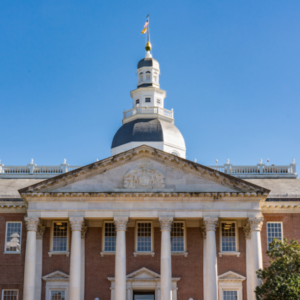Latest News - 2023 Legislative Overview
MDSPE tackles licensing, contracting issues in legislature
As the 2023 session of the Maryland General Assembly got underway in January, MDSPE began working on three key pieces of legislation that would impact the licensure and working conditions of professional engineers.
Wastewater Licensing
Under the provisions of SB 7/HB 30, individuals working on septic fields in Maryland would be required to complete training, earn certification and pay $150 biannually to obtain state licenses. This requirement would be in addition to county-level requirements that sewage pumpers, haulers and plumbers hold local licenses to complete septic system work. It would also expand the range of “on-site wastewater professionals” requiring state licenses to include professional engineers.
“Maryland has gotten really serious about septic systems,” said Chris Costello of Public Sector Consulting Group. Advocates for the bill “think septic systems could drain into little rivulets that get into streams that lead to the Bay, so they want every septic system overseen in a very serious way.”
In testimony to the House Committee on the Environment and Transportation, Costello argued that the state licensure requirement for engineers who have been professionally trained and licensed by the Board of Professional Engineers, “is redundant and places an undue burden on the industry.”
“As a professional engineer, I could design an entire sewage treatment plant to serve tens of thousands of people but somehow I need an extra license to design a septic field for a single family home. It doesn’t seem appropriate in any way,” said John Motsco, P.E., Senior Project Manager at D.S. Thaler & Assoc. and Vice President of Legislation for MDSPE. “The point of the professional engineering license is to ensure you are qualified to complete work in your field and you keep up those qualifications through ongoing education. It is far more rigorous than anything they are proposing in this bill.”
MDSPE is asking members to contact their state representatives and senators and urge them to exclude PEs from the licensing, certification and jurisdiction of the state Board of On-Site Wastewater Services proposed in SB 7/HB 30.
“We hope members will reach out to the elected officials about this issue. If they don’t think anybody cares about this issue, they are not going to take the time to look into it,” Motsco said.
 Duty to Defend
Duty to Defend
For several years, the Maryland Society of Professional Engineers in cooperation with the Maryland Council of Engineering Companies MD (ACEC/MD) has pursued legislation to eliminate “duty to defend” or indemnification clauses from contracts. Such clauses expand the liability of design professionals and consulting engineers, making them potentially liable for any claims (and associated legal fees) against a project regardless of whether they were directly responsible for the sited damages.
In the 2022 General Assembly session, the Senate passed the legislation unanimously. Opposition from Maryland’s Attorney General and the chair of the House Judiciary Committee, however, ensured the bill never proceeded to a vote in the House.
Maryland’s new Attorney General Anthony Brown has publicly stated that he would not oppose the bill. Staff in the AG’s office, however, continue to raise objections. AG staff have proposed meeting with the Maryland Association of Counties and contractors’ representatives to discuss the legislation and explore possible compromises, Costello said.
In a letter to the Senate Judicial Proceedings Committee, the American Council of Engineering Companied/Maryland argued that the indemnity (or duty to defend) clauses included in many government and some private contracts are fundamentally unfair to contractors and prevent many small and minority-owned firms from winning government work.
“Many of our members are engaged in the design of our public water and wastewater systems, bridges, highways, building structures and environmental projects. Forty-five percent of ACEC/MD’s members are certified small, minority- or women-owned businesses,” wrote Chad Faison, Executive Director. “Design professionals (architects, engineers, land surveyors) should not be asked to indemnify or defend another party for losses for which they are not responsible and cannot obtain insurance protection. Unfortunately, some public agencies and private business entities will include indemnification clauses in their contracts that require a design professional to indemnify them beyond what the professional liability insurance will cover. When design professionals – including many small, minority- and women-owned firms – refuse to agree to these provisions, they are not selected for these contracts.”
Such indemnification clauses run counter to public policy and should be void and unenforceable, ACEC/MD argued.
Fundamentals of Engineering
At the beginning of the 2023 session, MDSPE set out to advance legislation that would require non-academic-path engineers to pass the Fundamentals of Engineering exam in order to become licensed PEs in Maryland. Currently, engineering professionals who do not have a degree in engineering, can become licensed by completing 12 years of supervised engineering work and passing the PE exam.
“Maryland is one of 15 states with a non-academic option and there are 28 other states that waive the Fundamentals of Engineering exam for various reasons,” Costello said. “However, there are numerous states that require professional engineers to have a college degree and the FE exam.”
The preservation of that non-academic path is meeting with some resistance from the National Society of Professional Engineers and the engineering societies in some adjoining states, Motsco said. Some states have indicated that “in future it might be difficult for a Maryland professional engineer to get reciprocity in licensing because we still allow this non-academic path.”
To address that concern, MDSPE has proposed that engineers on the non-academic path also be required to pass the Fundamentals of Engineering exam — a test that would demonstrate broad knowledge of engineering principles.
“I feel that you want to maintain this path to licensure for people who don’t have the same opportunity that the rest of us do,” Motsco said. “Just because they didn’t go to college doesn’t mean they can’t become good engineers as well.”
During the first month of the General Assembly session, however, MDSPE could not garner enough support to introduce the bill.
